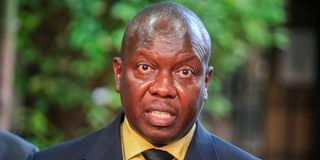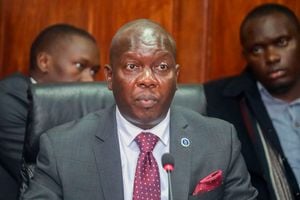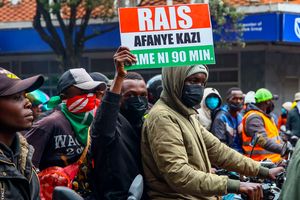
Director of Public Prosecutions Renson Ingonga addresses the media in Nairobi on July 23, 2024.
Apart from withdrawing sleaze cases that touched on the politically correct, we all assumed that Renson Ingonga, the Director of Public Prosecutions, had left no other room to aid demagogues in the saddle. This week, he squeezed yet another addition by telling us that he cannot find, nay prosecute, the policemen who killed the Gen Z demonstrators. How now?
In the history of abductions, extra-judicial killings, and cold cases, we are on a new high ever since the unexplained Yala River killings of the Kenyatta II regime. Since Jomo Kenyatta, each regime has left its skeletons and a list of untouchables. It is the untouchables of the Jomo Kenyatta era who killed J.M. Kariuki in 1975 and got away with it since Attorney General Charles Njonjo was not willing to prosecute the police officers who had been mentioned. As a result, the JM assassination will forever hang like a noose on Kenyatta's presidency.
The Moi presidency followed Kenyatta’s “footsteps”, and they opened the basement torture chambers at Nyayo House, Nairobi. While the victims over the years identified the torturers who included James Opiyo, neither the Attorney General nor the Public Prosecutor has ever thought it right to prosecute the torturers. We also had the circus of Armenian Brothers, Artur Magaryan and Sargasyan, the two drug dealers who had penetrated the police force and were decorated as Assistant Commissioners of Police. They were never prosecuted despite leading a raid on Standard newspaper and other notorieties. That planted seeds of impunity – and we saw Yala River become a site of horror. In 2024, we see armed masked “goons” working alongside policemen, and return of extrajudicial killings and kidnappings.
The surge in the number of those abducted reminds us of the 1987 case of Stephen Mbaraka Karanja, the Kiambu farmer turned activist who disappeared without a trace. After Karanja's wife filed for a writ of habeas corpus, Justice Norbury Dugdale threatened to jail Noah arap Too, the head of the Criminal Investigation Department, for contempt of court. It was then that the police claimed that Karanja was shot while running away from his interrogators. Justice Schofield ordered the police to exhume the body – but after opening 23 graves at the Eldoret Public Cemetery, the gravediggers could not trace his body. Mbaraka Karanja was secretly cremated – an indicator that police were running a secret crematorium. Dugdale had thought he could use the Karanja case to test the place of the Judiciary within a tyranny. But Chief Justice Cecil Miller withdrew him from the case and transferred him to Meru. He refused to go and opted to resign.
By then, the Deputy Public Prosecutor position was used to sanitise court proceedings. Those who passed through Bernard Chunga during the Mwakenya cases know the story of the after-office-hours trials in a courtroom packed with special branch officers and torturers. Some victims were brought to court limping, hungry and haggard. Going to prison, rather than going back to the torture chambers, was their only route to freedom. My good friend Mugo Theuri's new book, Threads of Time, tells this story well.
66 people missing
As I write this, the Kenya National Human Rights Commission says that 66 people are missing. We have had cases of Gen Zs who have been in police custody for weeks – and yet, the ODPP has not forcefully come out to defend the public interest. Mothers out there cry for justice, but Ingonga is not helping them either.
While the Constitution grants the DPP the right to direct the Inspector-General of Police “to investigate any information or allegation of criminal conduct” and the Inspector-General a duty to comply with any such direction, a critical look at the ODPP's performance indicates that it is the weakest link in our quest for justice. We must rethink that office when we get another chance to rewrite the Constitution. The ODPP was given independence due to our experience with then-Attorney General Amos Wako, who would take over private prosecutions involving police excesses and terminate them.
Days are gone when we had James Karugu, the former Attorney-General, who would boldly state that justice has not been done – as he did in the Monica Njeri case in which an American sailor, Frank Sundstrom, was fined for killing the call girl. Ingonga heads an important public office and had promised to right the wrongs of yesteryear. Sadly, he won't, and his officers now chase Mickey Mouse cases after letting go of the barons of sleaze.
During his short tenure, the Judiciary has lamented “prosecution-assisted acquittals” after the country watched in dismay as his officers – especially Geoffrey Obiri and Oliver Mureithi - openly refused to perform their duties in a multi-million-shilling case. For instance, in the Arror and Kimwarer case, the prosecution scheduled and failed to interrogate 41 witnesses, and the accused sheepishly smiled at the dock. He was later set free for "lack of evidence." We kept quiet, and the ODPP thought we agreed with his decision.
Withdrawing corruption cases
We all know that when the Office of the Director of Public Prosecutions, then headed by Noordin Haji, started withdrawing corruption cases filed during President Kenyatta's reign, they believed they were aiding President William Ruto and tarnishing the reputation of the former Director of Criminal Investigations, George Kinoti. Instead, it was the first clear sign that Kenya Kwanza was on a path of self-destruction, embracing self-defeating behaviour. The chickens have now come home to roost, and the Gen Z uprisings have pushed the Ruto regime to frontiers of transparency that were anathema to them. That is why we should focus on ODPP and ask: Have the powers bestowed into this office been abused?
If you have followed Justice Prof Nixon Sifuna's rulings, you will realise that he raised some important points and questioned the integrity of holders of this office. If there are people to step aside, going forward, Igonga should lead from the front. Why? Justice Sifuna has lamented the “Simon Makonde style” in which ODPP has treated cases involving corruption: “Today the suit is filed, tomorrow it is alive, and the next day it has been suffocated to death by its own initiator.”
Is that a reliable person?
Justice Sifuna read more than an innocent withdrawal of those cases and suggested: “To stem such surreptitious withdrawals and terminations, this country should consider mounting periodic lifestyle audits and integrity tests for its investigators and prosecutors. This will not only ensure integrity and accountability but will also restore public confidence in such institutions and agencies.” What was the Judiciary telling us? Prof Sifuna would see more from where he sat. He said this was the only way to stop “deal-cutting, blackmail, or with-hunt”. Those are heavy words coming from the Bench and directed towards an institution that is our gatekeeper in our fight against corruption.
This month, the High Court ruled that it was illegal to appoint individuals facing corruption charges into office – in the case against Anthony Mwaura, the tenderpreneur who replaced Francis Muthaura as the Kenya Revenue Authority chairman. Mwaura had his case withdrawn in a similar style. Many others were sabotaged, according to the Judiciary, or the ODPP made sure they collapsed.
Where do we go from here?
As the police service’s clean-up continues, if it is not cosmetic, and as we focus on the Executive to return to sanity, the time has come to focus on the ODPP. The regime there has made many blunders, stood against the public interest, and served executive interests. Is it any wonder that all those who had their cases withdrawn were appointed to senior positions? The ODPP has tarnished its image to the extent that we need a new fillip. Those who sabotaged corruption cases should face justice one day. We still remember. But his failure to prosecute the Gen Z killers adds a chapter to our history of impunity.
***
President William Ruto has said that he will fight corruption. At what point in his presidency will he hand the land on which Weston Hotel stands? The President knows that this was public land and that he cannot fight corruption with dirty hands.
[email protected] @Johnkamau1










